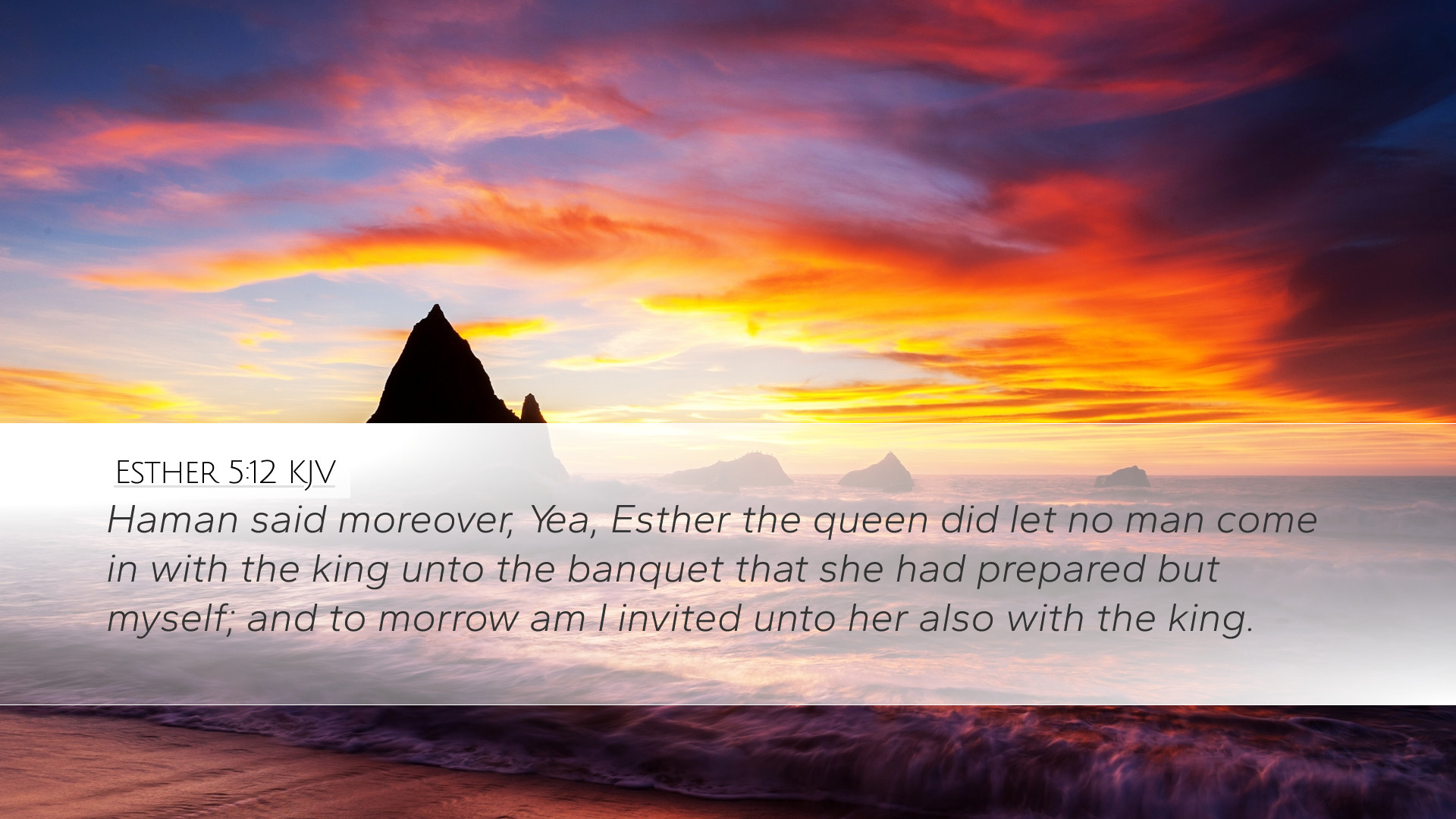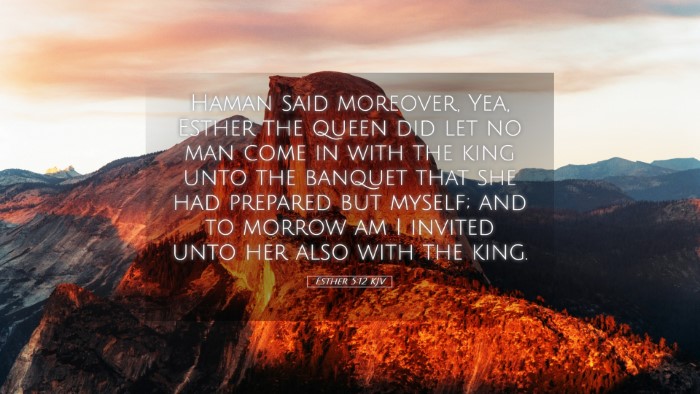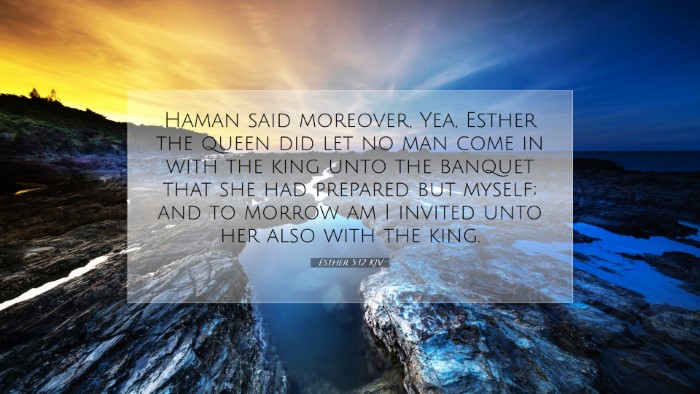Old Testament
Genesis Exodus Leviticus Numbers Deuteronomy Joshua Judges Ruth 1 Samuel 2 Samuel 1 Kings 2 Kings 1 Chronicles 2 Chronicles Ezra Nehemiah Esther Job Psalms Proverbs Ecclesiastes Song of Solomon Isaiah Jeremiah Lamentations Ezekiel Daniel Hosea Joel Amos Obadiah Jonah Micah Nahum Habakkuk Zephaniah Haggai Zechariah MalachiEsther 5:12
Esther 5:12 KJV
Haman said moreover, Yea, Esther the queen did let no man come in with the king unto the banquet that she had prepared but myself; and to morrow am I invited unto her also with the king.
Esther 5:12 Bible Commentary
Commentary on Esther 5:12
Verse Reference: Esther 5:12 - "And Haman said moreover, Yea, Esther the queen did let no man come in with the king unto the banquet that she had prepared but myself; and tomorrow am I invited unto her also with the king."
Contextual Overview
This verse occurs in a pivotal moment within the Book of Esther, reflecting Haman's pride and his intricate schemes against the Jewish people. To fully appreciate the depth of this verse, one must consider its narrative context, the characters involved, and the theological implications that emerge from it.
Historical Context
The Book of Esther is set during the reign of King Ahasuerus (Xerxes I), a time characterized by political intrigue, imperial ambitions, and cultural contrasts. The events unfold within the Persian Empire, where the Jewish people lived in exile. Haman, the antagonist of the story, rises to a position of great power, but his downfall begins as Esther, a Jewish queen, navigates her vital role in advocating for her people.
Thematic Insights from Public Domain Commentaries
Matthew Henry’s Commentary
Matthew Henry emphasizes Haman's arrogance and how it reflects human pride in opposition to divine providence. He notes that Haman's declaration about being the only one invited to the queen’s banquet illustrates both his self-importance and his ignorance of God's overarching plan. Henry posits that Haman's inflated sense of his worth ultimately leads to his demise.
Albert Barnes’ Notes on the Bible
Albert Barnes discusses the significance of Esther’s decision to invite only Haman and the king to her banquet. He sees this as part of Esther's strategic approach to reveal Haman’s plot against the Jews. Barnes notes that while Haman is reveling in his perceived power, he remains oblivious to the brewing danger surrounding him. The exclusivity of the invitation serves to intensify Haman's ego while setting the stage for the revelation of his schemes.
Adam Clarke’s Commentary
Adam Clarke elaborates on the psychological dynamics at play within Haman’s statement. He highlights how Haman's enjoyment of the moment not only reflects sinful pride but also a blinded ambition. Clarke suggests that the invitation makes Haman feel favored, prompting him to boast about it even as he unwittingly walks into a trap laid by God. Clarke underscores Esther’s wisdom, as her actions have a higher purpose in divine providence.
Exegetical Analysis
The verse reveals key elements of characterization—Haman’s smugness, Esther’s cunning strategy, and the unfolding tension between good and evil. Each character plays a significant role in the divine narrative at play, providing rich fodder for theological reflection.
Character of Haman
Haman's obsession with status is central to understanding this verse. Obsessed with recognition, Haman sees his invitation as validation of his power. This moment encapsulates the hubris characteristic of many biblical villains—self-deception leading to their downfall. The deeper theological message suggests that pride goes before destruction, a recurring theme in scripture (Proverbs 16:18).
The Role of Esther
Esther’s strategic maneuvering showcases her intelligence and bravery. By inviting Haman specifically, she positions herself as an agent of change within the empire. Her actions are characterized by both courage and discernment, crafted through prayer and fasting (Esther 4:16). The verse reflects her understanding of the critical timing necessary for delivering her people from destruction.
Theological Implications
The interactions depicted in this verse raise profound questions about divine providence, human agency, and moral decision-making.
Divine Providence
The unfolding events, as indicated through Esther's planned banquet and Haman’s resultant arrogance, imply a sovereign control that shapes history toward God’s intended outcomes. The Hebrew understanding of providence emphasizes that even in human actions, God moves fortuitously to fulfill His promise of salvation to His people.
Human Agency and Spiritual Warfare
The narrative highlights the struggle between good and evil. Haman represents the dark forces that seek to destroy the faithful, while Esther acts as the light. This tension showcases the reality of spiritual warfare, encouraging believers to remain vigilant and thoughtful in their actions as they navigate through their own trials.
Practical Applications for Today
For pastors, students, theologians, and scholars, Esther 5:12 serves as a reminder of the complexity of God’s plans as they unfold in human history. It encourages reflection on the following:
- The Importance of Humility: Just as Haman’s pride led to his downfall, believers are reminded to walk with humility before God and others.
- Strategic Action in the Face of Adversity: Esther’s example showcases the need for wisdom and discernment in taking action when advocating for justice.
- Trust in Divine Timing: The narrative teaches that God’s timing is often different than our own, but it is always for His purpose.
- Awareness of Spiritual Struggles: Understanding that the challenges faced may involve greater spiritual battles encourages vigilance and prayerfulness.
Conclusion
Esther 5:12 serves as a profound illustration of the interplay between human pride, divine providence, and the courage required to stand for righteousness. As believers reflect on Haman's insignificance and Esther's bravery, they are invited to acknowledge the unseen hand of God—working through the folly of mankind to achieve His good purposes. The verses encourage a deeper appreciation for the complexities of faith, leadership, and moral action within the Christian journey.


